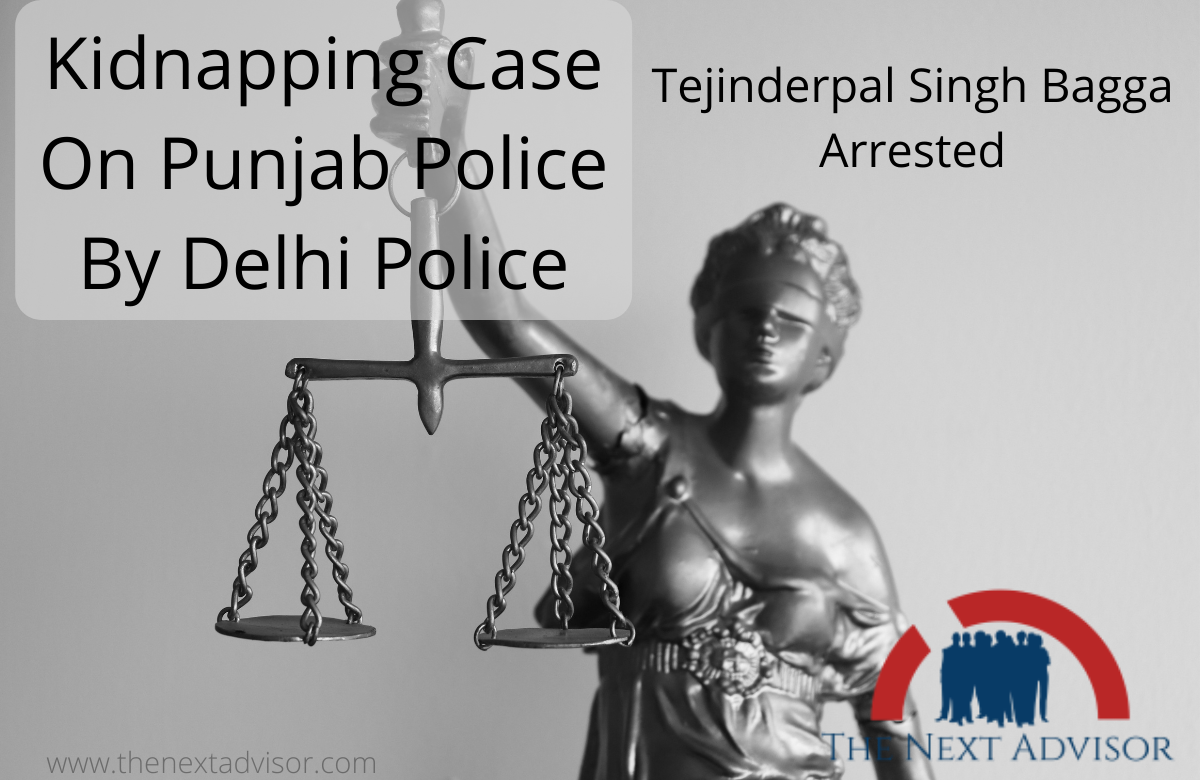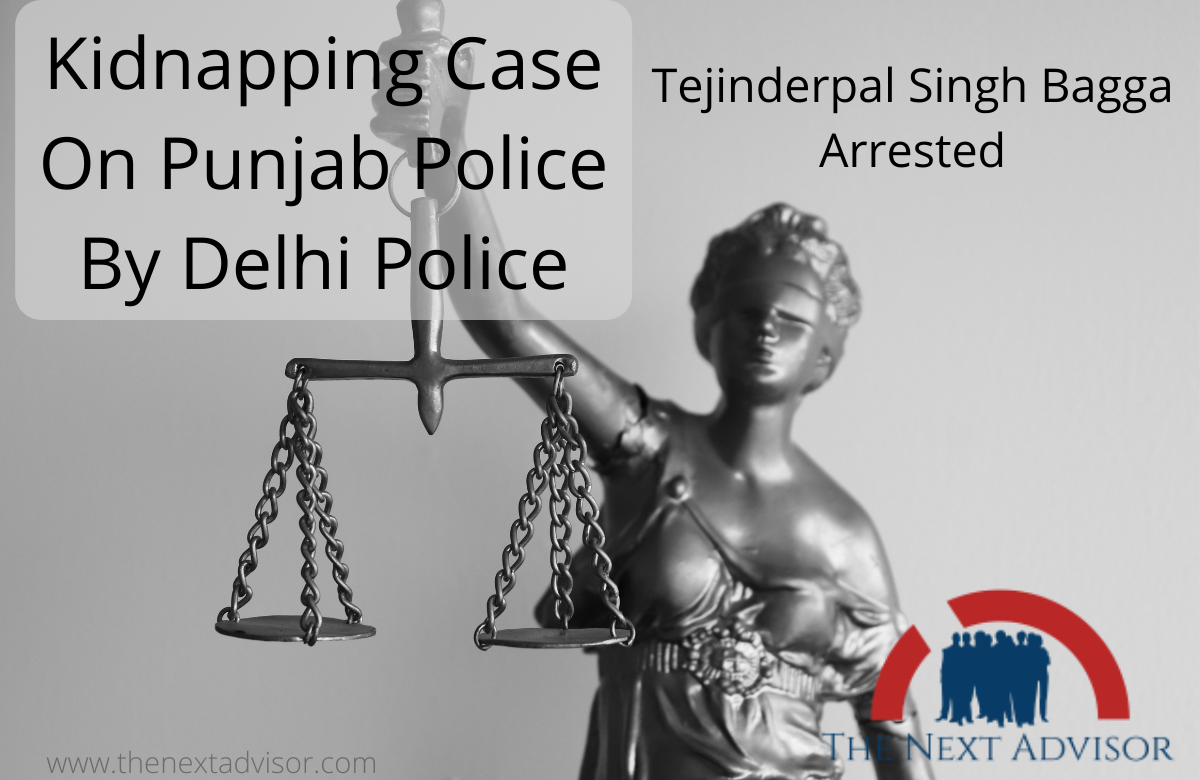Kidnapping Case On Punjab Police By Delhi Police let us see WHAT HAS HAPPENED?
What is the matter of the Kidnapping Case On Punjab Police By Delhi Police? The arrest of BJP leader Tejinderpal Singh Bagga by Punjab Police on Friday (May 6) precipitated a crisis after the Delhi Police registered a case of kidnapping against the Punjab Police (Kidnapping Case On Punjab Police By Delhi Police) team that apprehended Bagga.
The team, while transporting Bagga to Punjab, was then detained by Haryana Police en route and questioned on the basis of a warrant that Delhi Police got issued from a city court. By evening, Delhi Police had escorted Bagga back to the national capital.
WHAT IS THE PROCEDURE FOR INTERSTATE ARREST
Police is a State subject, and thus the jurisdiction of state police is limited to the state. Broadly, the intent of the law has been that a criminal in a particular state must be arrested by the police of that state. However, in certain circumstances, the law does allow the police of one state to arrest an accused in another state. This may be done by the execution of a warrant issued by a competent court, or even without a warrant – in which case the concerned state police must inform the local police about the arrest.
The powers of the police to arrest an accused in another state have not been defined clearly as far as arresting without a warrant is concerned. Section 48 of the Code of Criminal Procedure (CrPC) gives the police such powers, but the procedure is not defined. Section 48 merely says, “A police officer may, for the purpose of arresting without warrant any person whom he is authorized to arrest, pursue such person into any place in India.”
Section 79 of the CrPC deals with inter-state arrests on the basis of warrants issued by competent courts. This section lays down detailed procedures for such arrests. However, this is not applicable to the case of Bagga, as Punjab Police made the arrest without a warrant – which it has the power to do.
In the present case, Punjab Police have maintained that Bagga had been served five summons to join the investigations with regard to a case, Where he has been accused of making death threats to Delhi Chief Minister Arvind Kejriwal, but he failed to appear for questioning. Police, however, have an obligation to present an arrested person before a magistrate within 24 hours as per article 22(2) of the Constitution of India.
ANY COURT ORDER ON INTER-STATE ARREST?
In 2019, in the ‘The Sandeep Kumar vs The State (Govt. Of NCT Of Delhi) case, the Delhi High Court issued certain guidelines for inter-state arrests. These state that a police officer must seek permission from his superior, in writing or on the phone, to visit another state to arrest a criminal. He must record reasons for such a move in writing, and first, make an endeavor to get an arrest warrant from a court except in “emergent cases”.
He must also make “a comprehensive departure entry in the Daily Diary of his Police Station” before proceeding to another state. After reaching the other state, he should inform the concerned police station of the purpose of his visit to seek assistance and cooperation. “The concerned should provide/render all legal assistance to him. Entry to this effect must be made at the said police station,” the guidelines said.

Kidnapping Case On Punjab Police By Delhi Police
ARE THESE GUIDELINES FOLLOWED?
Police sources say that in most cases the guidelines are indeed followed, in spirit if not in letter. “Police from another state always at least inform the local police of their impending operation unless they feel that the operation itself may be compromised if local police are informed. Even then, the police are informed later. Generally, issues do not arise. Problems arise only in contentious and political cases,” a senior police officer said.
In many cases, the accused are picked up in a state based on an informal understanding with the police of that state and Are then shown to have been arrested in the state to which the arresting police team belongs.
OTHER PROMINENT INTERSTATE ARREST
The case of environmental activist Disha Ravi has been often discussed in this context. Delhi Police arrested Ravi in Bengaluru in the case related to the circulation of a “toolkit” during the farmers’ protest in Delhi in 2021. Bengaluru Police were informed only after Ravi had been taken into custody. There were protests in Bengaluru against the Delhi Police action.
Last month, Gujarat MLA Jignesh Mevani was arrested by the Assam Police in Gujarat in connection with a social media post made by him. Earlier in 2013, Delhi Police had arrested former Hizb-ul- Mujahideen militant Liaquat Shah from the India-Nepal border in UP with a cache of arms and claimed that he was about to carry out a terrorist attack in Delhi.
CONCLUSION of the above explanation about the Kidnapping Case On Punjab Police By Delhi Police
Police sources said on Friday that the turn of events in the Bagga case was unfortunate, and could have repercussions for future police operations. While the merits of the case against Bagga may be debatable, police officers say the (Kidnapping Case On Punjab Police By Delhi Police) Delhi Police’s action of registering a case of kidnapping against another state police for not following procedure could set a precedent that many states may begin to follow.
“Barring the NIA, no agency or police has pan-India jurisdiction. What happens if a central agency such as the CBI or the Enforcement Directorate makes an arrest without a warrant in an urgent matter, and is booked for kidnapping by the state police? While the matter will eventually be settled in court, it will likely ensure that agencies and police hesitate to conduct operations in other states,” a senior police officer said.

























